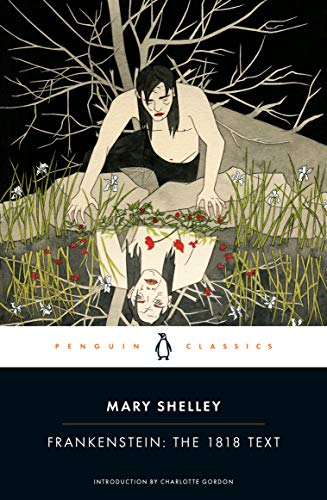Frankenstein
The 1818 Text (Penguin Classics)
Mary Shelley
BOOK REVIEW

When the name Frankenstein emerges, a visceral reaction is sparked across generations. This isn't just a tale of a creature stitched together from the remnants of the dead; it's a profound exploration of the human condition, touching themes of ambition, isolation, and the consequences of playing god. Written by the indomitable Mary Shelley, this masterpiece was birthed in a world on the cusp of modernity, reflecting a society grappling with the ethical dilemmas of scientific advancement.
In the darkest corners of your imagination, does it not send chills down your spine to think of Victor Frankenstein? An eager young scientist whose insatiable curiosity leads him to defy nature itself. He constructs a being, a grotesque embodiment of his hubris, only to recoil in horror at what he has created. Out of the shadows, the Creature yearns for acceptance, but society instead casts him into an abyss of hatred and fear. This cruel irony of existence-creating life only to shun it-leaves your heart heavy, doesn't it? 💔
The 1818 text of Frankenstein takes you on a journey through the chilling frames of Romanticism, interwoven with the raw threads of Gothic literature. Shelley dared to challenge the boundaries of morality, maternity, and monstrosity, opening a Pandora's box that still reverberates in modern debates surrounding technology and ethics. Through the pages, you're not merely observing; you're thrust into existential contemplation. What makes one a monster? Is it appearance, or is it the abandonment, the desire for companionship, and the depths of despair?
Readers are divided, grappling with the moral implications woven throughout the storyline. Some hail Frankenstein as a revolutionary text that foreshadowed the horrors of scientific recklessness, while critics argue that Victor Frankenstein's torment reflects the inherent flaws of man's quest for knowledge. A passionate debate emerges, drawing parallels to today's discussions on artificial intelligence, genetic manipulation, and the fine line between progress and peril.
But let's not forget how the Creature's plight strikes a chord with many, echoing in the hearts of those who have felt the sting of rejection and loneliness. The anguish of longing for acceptance resonates beyond the 19th century into today's world, where societal pressures often lead to ostracism for the 'other.' This is where Shelley's brilliance shines: she ignites empathy within the reader, compelling you to consider the ramifications of neglect and the innate human need for connection.
As you delve deeper, you'll discover how this tale of horror has influenced countless creatives-from filmmakers to authors, shaping genres and challenging cultural norms. The echoes of Frankenstein can be heard in contemporary narratives, urging you to confront discomfort and recognize the human experience in all its complexity. Imagine-could Mary Shelley have known the profound impact her work would have on future generations? 🌍
Amid the cacophony of modern literature, Frankenstein remains a haunting reminder of the fragility of human existence. A symphony of emotion, trauma, and philosophical inquiry, this novel beckons you to reflect on the interplay of creator and creation. It asks you-not just to read-but to feel. To ponder the essence of life. It insists that you wrestle with the shadows lurking in the corners of your mind.
So, will you accept the challenge? Will you allow Frankenstein to stir your thoughts, ignite your passions, and plunge you into contemplation? As you walk away from Shelley's haunting narrative, holding the weight of her profound insights, remember: the true monster lies neither in the grotesque figure of the Creature nor in the ambitious scientist but within the very fabric of society that sometimes dares to define what is 'normal'-and what is not. 🖤
📖 Frankenstein: The 1818 Text (Penguin Classics)
✍ by Mary Shelley
🧾 200 pages
2018
#frankenstein #1818 #text #penguin #classics #mary #shelley #MaryShelley